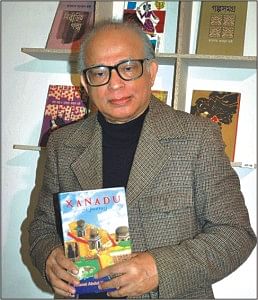Hasnat Abdul Hye's book exhibition

Hasnat Abdul HyePhoto: STAR
A unique display of Hasnat Abdul Hye's books took place recently at the Bengal Gallery. Two of his books -- one, an autobiography -- were launched on this occasion. The Bengal café looked splendid with the numerous colourful book covers, placed intermittently with posters of press cuttings. Despite the rain the turnout on the launching day was remarkable.
The first book is Portrait of a Writer and it contains two sections: one in English and the other in Bangla. Each part contains experiences of the writer as a litterateur and reviews of his books. In the second half are excerpts from Hye's books. This includes his haiku poems, his first short story Carnival (written in 1960), and his last short story Still Life. The line up also features his first travelogue, Manhattan and Ten Dollars.
The last section of the book presents interviews taken at different times, like the piece that appeared in The Daily Star by Ziaul Karim, another in Sangbad by Shourab, and by Bhagirat Misra from Kolkata. There is also a piece by William Radichi, a Tagore scholar. The introduction of the English section is by Dr Akhter Hamid Khan.
The second book Boyhood in British India and Pakistan is a collection of autobiographical columns that appeared in Daily News under the banner Aide Memoire. This covers a period from 1943 to 1954, which comprises his childhood experiences and recollections, beginning as a boy of four. Hye has woven his narrative around his family, including his grandparents, uncles and eight siblings.
“As a child I saw the Congress Party members bringing out procession and it being blocked by the police, as our house was adjacent to the police station. From that I could gather that there was a conflict. Later on I saw the Calcutta Riots, with people being butchered before my eyes. However, although I felt the tension, I didn't, at that time, quite comprehend the politics behind it all.”
Later, with the backdrop of the riots and communal agitations, Hye took the help of books written by historians and analysed the history of Partition. Asked if he thought that the Partition was justified.
The book depicts Ramadan, Ashura, Hindu festivals and other social and cultural lives in different places, as Hye's father was posted in numerous places, ranging from small towns to metropolises.
The exhibition was a veritable feast for book lovers.

 For all latest news, follow The Daily Star's Google News channel.
For all latest news, follow The Daily Star's Google News channel. 



Comments